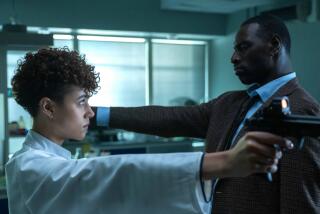In Thrall to a Romantic Spell
Given that it settled on a title scant days before its world premiere last year at Cannes, “In the Mood for Love” is remarkably well-named. A swooningly cinematic exploration of romantic longing, both restrained and sensual, luxuriating in color, texture and sound, this film raises its fascination with enveloping atmosphere and suppressed emotion to a ravishing, almost hypnotic level.
With Hong Kong stars Tony Leung Chiu-wai and Maggie Cheung playing a couple caught in a vortex of quiet passion, “In the Mood for Love” will likely be the breakthrough work for that city’s celebrated writer-director Wong Kar-wai, an international critical favorite whose previous films, including “Days of Being Wild” and “Chungking Express,” have had limited exposure in this country.
This time, however, the conventional nature of the material--a love story that is not only set in Hong Kong in 1962, but is PG-chaste enough to have been filmed then and there--makes it easier to appreciate the visual assurance and provocative, intimate directing style that have made all seven of Wong’s films major award-winners. (At Cannes, “In the Mood” took the best actor award for Leung and also received the Grand Prix de la Technique for its exceptional look.)
Married but not to each other, Chow Mo-wan (Leung) and Su Li-zhen (Cheung) meet when they rent adjacent rooms in a large apartment building. His wife has the late shift as a hotel receptionist, while her husband, Mr. Chan, works for a Japanese company and is often away on business, which means that no one, including the audience, gets more than a fleeting glimpse of either spouse.
Both these people are quiet, considerate, exquisitely polite and much less boisterous than their landlord’s extended family. Earnest and boyish, with carefully slicked-down hair, Mr. Chow works as a journalist, but with his anonymous suit and tie, he could be any kind of businessman. Mrs. Chan, however, would stand out anywhere.
*
Poised and impeccably turned out, with never so much as a hair out of place, Mrs. Chan has the ability to stop your heart just by walking from her room to a neighborhood take-out stand with a combination of grace and loneliness that seems almost tragic. As costumed by William Chang Suk-ping, she dresses in nothing but cheongsams, more than 20 in a wonderful variety of fabrics, giving the traditional high-necked sheath once popular in Shanghai more screen time than it’s had since “The World of Suzie Wong.” Even her neighbors are impressed. “She dresses up like that,” one of them says, “to go out for noodles.”
Ever so gradually, as hints mount and their paths cross on the way to lonely take-out dinners, Mr. Chow and Mrs. Chan come to realize that not only are both their spouses having an affair, but they’re having it with each other. This naturally brings these two closer, but because they are innately decent people and still care for their partners, how involved they will allow themselves to become turns into a potent, disruptive question with a surprising amount of emotional pull.
Essential in giving their quandary its due is the director’s choice of visual styles. Working with two cameramen, his regular director of photography, Christopher Doyle, and Mark Li Ping-bin, who usually films for Taiwanese director Hou Hsiao-Hsien, Wong Kar-wai turns his lens into a visual eavesdropper, peering around corners and looking at things from covert angles, the better to emphasize both the confining, restrictive nature of the characters’ lives--”One can’t put a foot wrong,” Mrs. Chan wails--and the potentially illicit nature of their relationship.
Adding to the superb sense of ambience is the film’s alluring use of muted yet vivid color. With sublime production design (William Chang Suk-ping once again, and he also did the editing), “In the Mood” is a dream of complementary pastels, with window blinds, wallpaper, kitchen appliances, shower curtains, even telephones all part of a rapturous color scheme. Also helping is the melancholy, insinuating music, by Michael Galasso and Umebayashi Shigeru, with some haunting Nat King Cole singing in Spanish artfully thrown into the mix.
Though Wong began in films as a screenwriter, as a director he’s known not to believe in scripting anything until the very last minute. This method doesn’t usually have a high percentage of success, but in this case, because his stars have worked several times both with him and with each other, a surprising amount of intimacy is achieved. The result is a kind of ultimate romantic film, joining an almost Jamesian sadness and discipline to that extraordinary visual sensibility. It’s not the kind of thing you see every day.
* MPAA rating: PG, for thematic elements and brief language. Times guidelines: It’s all extremely genteel.
‘In the Mood for Love’
Tony Leung Chiu-wai: Chow Mo-wan
Maggie Cheung: Su Li-zhen, Mrs. Chan
Rebecca Pan: Mrs. Pan
Lai Chin: Mr. Ho
Siu Ping Lam: Ah Ping
Chin Tsi-ang: The Amah
A Block 2 Pictures Inc. presentation with the participation of Paradis Films of a Jet Tone Films Limited production, released by USA Films. Director Wong Kar-wai. Producer Wong Kar-wai. Executive producer Chan Ye-cheng. Screenplay Wong Kar-wai. Cinematographers Christopher Doyle, Mark Li Ping-bin. Editor William Chang Suk-ping. Costumes William Chang Suk-ping. Music Michael Galasso, Umebayashi Shigeru. Production design William Chang Suk-ping. Art directors Alfred Yau Wai-ming, Man Lim-chung. Running time: 1 hour, 37 minutes.
At selected theaters.
More to Read
Only good movies
Get the Indie Focus newsletter, Mark Olsen's weekly guide to the world of cinema.
You may occasionally receive promotional content from the Los Angeles Times.











